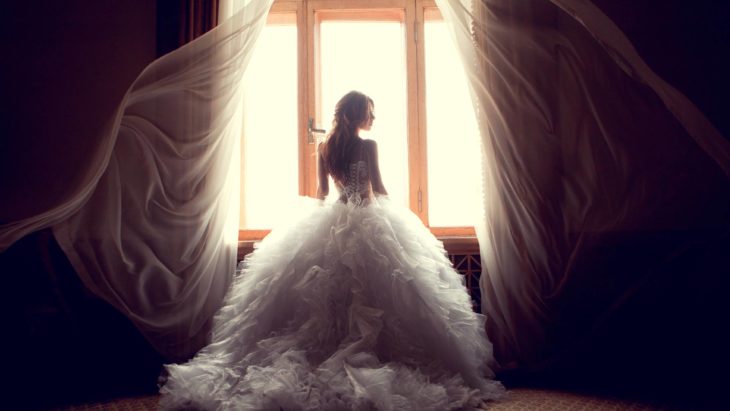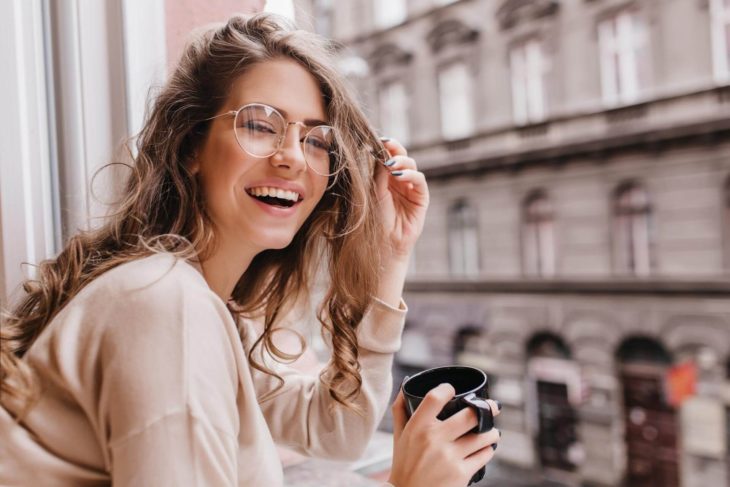“Are you going to grow your hair out for the wedding?”
Obviously my stylist needed to know, because she was standing there with scissors. But family members? Dress shop employees? After the hundredth time telling people “No,” it got a little tiresome.
The question, in and of itself, isn’t offensive or stupid. It’s probably just small talk. After all, it’s incredibly uncommon to see short-haired brides, especially represented in mainstream wedding-related media; it’s understandable why people ask.
But there are an awful lot of preconceived notions about weddings and femininity and the all-importantness of a one-day event packed into that deceptively innocent sentence.
Under the surface, here’s what I hear people asking, variously: How much work and sacrifice are you willing to put into have your perfect day? Do you realize that your wedding day should be the number-one consideration for all decisions you make now? Don’t you think long hair is prettier? How feminine are you? How feminine do you think a bride should be? Don’t you want to look like a real bride? Who do you want to be on your wedding day?
If there’s anyone in the world who’s supposed to be more feminine than a bride, I don’t know who it might be; brides are, all at once, encouraged to embody everything society considers to be traditionally feminine. They should have long hair and beautiful faces and petite silhouettes; they should wear dresses in the most delicate color, and those dresses should be elaborate and expensive, implying that the bride should not be too active or aggressive.

Source: Feelfeed
A bride is not, in her most traditional incarnation, a person who moves, does, acts. She is a person to be looked upon; a thing of beauty to behold. Indeed, she is even traditionally given away, shepherded gently but authoritatively by other people, a beautiful treasure to be passed from one man to another.
Femininity and the production and performance thereof on my wedding day was on my mind throughout the aesthetic decision-making process. I chose a relatively cheap, short wedding dress but two different pairs of pricey designer and brand-name heels to wear at the ceremony and reception, one pair impossibly high and stupid and a second, very comfortable, kitten heel. I got my nails done, but I did my own makeup. I wore a veil, but not one that went over my face. I did not grow out my hair.
In fact, it was not until the weeks after our wedding that I idly thought I might like to have long hair again; after a multi-month growing-out experiment, I gave up and headed back to the hairdresser. I simply feel better having short hair. I feel more like myself. (And yes, I do have years of long-hairedness to compare it all with.)
I know that I feel differently today about how I perform femininity than I have at any other time in my life; I don’t know if I should attribute this to being in a long-term partnership, to being nearly 30 years old, or to becoming more active in the feminist and reproductive justice communities. Maybe it’s a combination of all of these things.
I do think spending eight months planning a wedding forced me to spend eight months confronting gender in a way I never had been asked to do before; weddings bring out the best and worst in friends, family members and strangers who alternately encourage both conformity and individuality and who mysteriously feel entitled to an explanation either way for every decision. I felt like every day, I was being asked to make a statement about what kind of woman I was, whether that was asserting my love of short hair or leaving half the decorating decisions to Patrick.
These days, I’m more likely than ever to reject a daily performance of aesthetic femininity—I tend to choose no makeup, baseball hats and sneakers as my default and have all but given up on shaving my legs with any regularity—but also am more likely to get dolled up for special events or nighttime outings. I wear ever more adventurous and silly makeup, but on fewer occasions than in the past; I actually own foundation. I’ve stopped buying beautiful shoes that hurt my feet because I’d rather be able to physically keep up with my husband on our big nights out than look pretty sitting in a chair. I’ve always been a fan of cowboy boots, but now I pair them with absolutely everything, because it means I’m never slipping or stumbling or splurging for a cab at the last minute.
I have to believe that this stems in no small part from feeling not at all obligated to be “ready” in case I meet a potential boyfriend, and I’m not particularly proud of that. I wish I could say that I conquered society’s oppressive beauty requirements all because of the sheer vagina-induced strength of my infinitely powerful feminist will, but the fact is, I used to dress up when I didn’t want to because I thought I might meet a guy. Now, I’ve met the guy. I meet him at the start of every day, wooing him with morning breath and a lopsided faux-hawk, and he seems perfectly fine with it.
I’m also simply older and wiser than my formerly more feminine selves. I’ve got more work experience and education than I did when I was a lipstick-and-heels-obsessed 21 year old; I feel more self-assured and confident about the things I have to offer the world intellectually and professionally. I have actual evidence that human beings find my work and skills important and valuable regardless of what I look like—after all, I’m a freelance writer who has only physically met a small portion of the people who sign her checks.

Source: batam
But while I’m in post-wedding baseball hats and baggy harem pants, feeling less pressure than ever to be whatever society imagines for a woman, there are surely women who believe their wifely status requires them to be ever more feminine. Specifically, there are the people on Wives With Beehives, who spend their days pretending to live in the 1950’s, fetishizing an American past they appear to have the shallowest possible understanding of, if we are to believe the editing and presentation of the show. There’s a lot of baking from scratch, cooking and cleaning to the nth degree, and ensuring that their home, hair, dress and makeup are all perfectly coiffed when Hubby comes through the door.
I have tried this kind of thing once in a blue moon—being the perfectly coiffed wife, putting dinner on the table, wearing an apron—because it seems kitschy and fun, and because it seems like an interesting experiment in seeing if acting or dressing a certain way will make me “feel” a certain way about being a wife or woman. But it usually turns out to be frustrating and exhausting. It’s never as satisfying to me as cooking dinner together with my husband, or vegging out to a few hours of delivered pizza and Downton Abbey with him on the couch.
But there’s still something about self-policing my own femininity, in my apron-and-heels moments, that I find adventurous. Because I spend less time than I ever have before wondering if I’m being the right kind of woman, or projecting the right version of sexuality or femininity to the world at large, it’s kind of a fun thought experiment to see if I can “do” traditional ladyness in my private life at home. I’m not saying I really get what the Wives With Beehives crowd is after—indeed, it seems like the worst kind of “I choose my wholly uninvestigated, oppressive choice!” decision-making—but I do recognize that I’m more willing than ever to both accept and reject traditional aesthetic performances of femininity.
Whether I have getting married, or being partnered, to credit or blame for it is a question I haven’t yet been able to answer.
Original by Andrea Grimes
